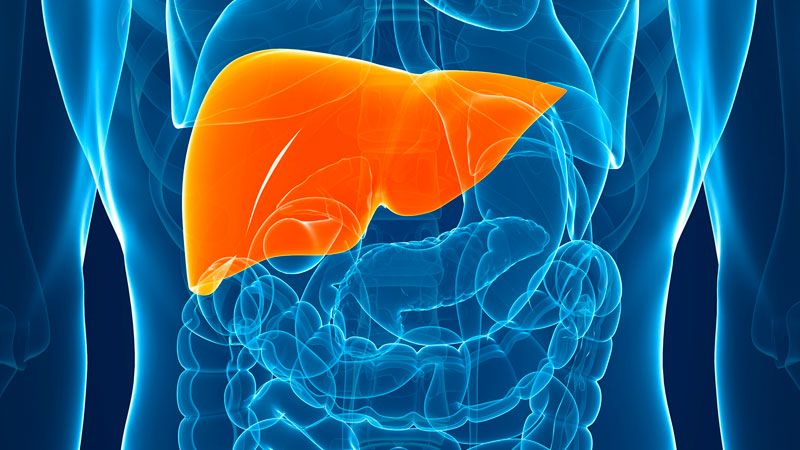Tislelizumab Could Be a First-Line Treatment for HCC
Tislelizumab met its primary end point of overall survival and exceeded that of sorafenib in patients with unresectable hepatocellular carcinoma.
3D illustration of human liver: ©PIC4U - stock.adobe.com

Tislelizumab (Tevimbra), an anti-PD-1 monoclonal antibody, demonstrated overall survival (OS) improvements vs sorafenib (Nexavar) in patients with unresectable hepatocellular carcinoma (HCC), according to a study published in JAMA Oncology.1
In the phase 3 RATIONALE-301 trial (NCT03412773), the median OS was 15.9 (95% CI, 13.2-19.7) months with tislelizumab vs 14.1 (95% CI, 12.5-17.4) months with sorafenib (hazard ratio [HR], 0.85; 95% CI, 0.71-1.02). Overall response rate (ORR) was 14.3% (n = 49) with tislelizumab vs 5.4% (n = 18) with sorafenib. The median duration of response was 36.1 (95% CI, 16.8 to not evaluable) months with tislelizumab vs 11.0 (95% CI, 6.2-14.7) months with sorafenib.
Tislelizumab did not outperform sorafenib in regard to progression-free survival (PFS). Median PFS was 2.1 (95%, CI 2.1-3.5) months with tislelizumab vs 3.4 (95% CI, 2.2-4.1) months with sorafenib (HR, 1.1; 95% CI, 0.92-1.33).
“The phase 3 RATIONALE-301 randomized clinical trial met its primary end point of OS noninferiority with single-agent tislelizumab vs sorafenib as first-line treatment for unresectable HCC. In addition, tislelizumab was associated with higher ORR and more durable responses compared with sorafenib. The Kaplan-Meier analysis demonstrated a 12-month OS delayed effect, with a 29.2% survival rate at 36 months and the plateau in the survival curve. These data suggest long-term survival benefits for patients treated with tislelizumab,” study authors wrote.
The study had an enrollment of 674 patients, including 570 (84.6%) men, and the median age was 61 (range, 23-86). The minimum follow-up time was 33 months.1 Patients in the tislelizumab arm received the 200 mg of the drug intravenously once a week. Patients in the sorafenib arm received 400 mg of the drug orally twice a day.2
To be eligible, patients needed to have histologically confirmed HCC, Barcelona Clinic liver cancer state B or C, no prior systemic therapy for HCC, Child-Pugh score A, an ECOG performance status greater than or equal to 1, and adequate organ function. Patients were excluded if there was known fibrolamellar or sarcomatoid HCC, mixed cholangiocarcinoma and HCC, regional therapy to the liver within 28 days of randomization, evidence of portal hypertension with bleeding esophageal or gastric varices with 6 months of randomization, tumor thrombus involving main trunk of portal vein or inferior vena cava, and active or a history of autoimmune disease or immune deficiency. Patients were also not eligible if they were being treated with anticoagulants, corticosteroids, or immunosuppressive drugs.2
As for safety, 96.2% (325 of 338) of patients in the tislelizumab arm experienced treatment-related adverse events (TRAEs) compared with 100% (n = 324) in the sorafenib arm. Grade 3 or higher TRAEs were observed in 22.2% (n = 75) in the tislelizumab arm vs 53.4% (n = 173) in the sorafenib arm. There was a lower incidence of TRAEs leading to drug discontinuation (21 [6.2%] vs 33 [10.2%]) and drug modification (68 [20.1%] vs 187 [57.7%]) with tislelizumab vs sorafenib, respectively.
“Tislelizumab demonstrated favorable safety…compared with sorafenib, indicating its potential suitability for patients who cannot tolerate TKI treatment. The most common [treatment-emergent adverse events] were driven by known toxic effects of tislelizumab and sorafenib,” study authors wrote.1
REFERENCES
1. Qin S, Kudo M, Meyer T, et al. Tislelizumab vs sorafenib as first-line treatment for unresectable hepatocellular carcinoma: a phase 3 randomized clinical trial. JAMA Oncology. [published online ahead of print, 2023 Oct 5]. JAMA Oncol. 2023;e234003. doi:10.1001/jamaoncol.2023.4003
2. Phase 3 study of tiselizumab versus sorafenib in participants with unresectable HCC. ClinicalTrials.gov. Updated July 5, 2023. Accessed October 12, 2023. https://clinicaltrials.gov/study/NCT03412773
Gholam Contrasts Lenvatinib With Other Options in Child-Pugh B HCC
December 21st 2024During a Case-Based Roundtable® event, Pierre Gholam, MD, discussed how post hoc and real-world analyses build upon the limited available trial data for treating patients with unresectable hepatocellular carcinoma with Child-Pugh B status.
Read More